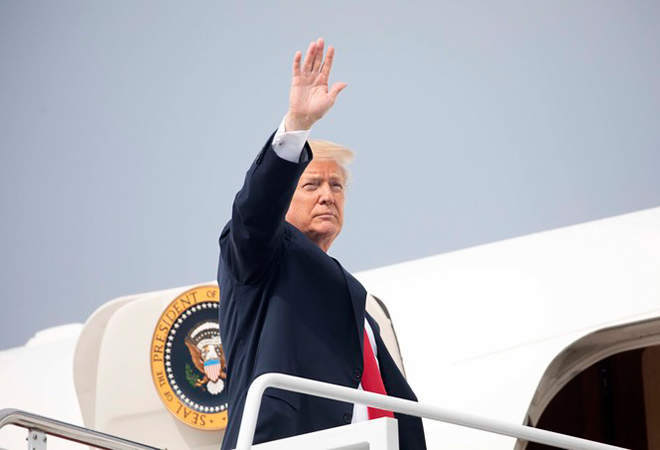
President Donald Trump’s decision to unilaterally withdraw the United States from the Joint Comprehensive Plan of Action (or simply, the Iran nuclear deal) has invited grim assessments of the action undermining US “reliability and responsibility” in the long-run. The consequences on America’s trans-Atlantic ties are increasingly clear as even the prospect of the US levying economic sanctions on European companies doing business with Iran is souring Washington’s bonhomie with its transatlantic allies of nearly three quarters of a century. Further, US allies in Asia watch nervously as the timing of the US withdrawal “complicates” the prospect of a deal over North Korea’s nuclear weapons right after Washington has scuttled “an existing one that everyone considered to be working.”
Such developments with regards to the US’ relations with its allies and partners often spark a conversation on America’s “credibility”. In underscoring the imperativeness of the same, pundits and policymakers often recount an anecdote dating back to the run-up to the Cuban Missile Crisis of 1962. Back then, the US’ intelligence community gathered photographic evidence of the Soviet missile activity in Cuba. In an attempt to muster diplomatic support beyond the Organisation of American States, President John F. Kennedy reached out to US allies in Western Europe. To France – another veto wielding power at the UN Security Council, Kennedy dispatched former Secretary of State Dean Acheson. At the meeting, French President Charles de Gaulle refused to see the photographic evidence that Acheson had bought across the Atlantic. Instead, de Gaulle simply replied, “The word of the president of the United States is good enough for me.”
It is believed that through the Cold War, asserting US credibility — carefully matching rhetoric with actual US foreign policy praxis, was crucial in maintaining its alliances across the world. The importance of which could hardly be overstated, as these partnerships in the strategic areas of Western Europe and East Asia were meant to balance out the Soviets and their vassals, and in a sense, uphold the geopolitical containment of Moscow.
In the post-Cold War world, however, as the Soviet expanse crumbled, emphases on US credibility outlived the bipolar system. Stemming from a strong neoclassical realist dictum of upholding a liberal world order via honing favourable balances of power, American primacy thrived owing to Washington’s multiple advantageous alliances and partnerships.
Thus, in the post-Cold War world, allies and partners not only played hosts to US forward operating military bases on their territories but also played ball when Washington needed more bite for its diplomatic bark. Recent instances of successfully cobbling a multiparty military coalition to combat the Islamic State or the coordinated diplomatic offensive to levy punitive economic sanctions on Russia for its actions in Ukraine stand as crucial cases in-point here.
Hence, preserving alliances and its “special relationships” with partners like Israel and the United Kingdom are deemed to be in US national security interests owing to the limits of American unilateralism –– which Secretary of Defense James Mattis once underscored as, “Not all the good ideas come from the nation with the most aircraft carriers.” However, a little over a year into the Trump presidency, US “credibility” has been undermined with the Trump administration’s withdrawal from the Trans-Pacific Partnership, the Paris Climate Accord and now, the Iran nuclear deal.
Moreover, it is important to note that multilateral deals such as the one with Iran involved considerable cooperation with countries that would otherwise be deemed adversarial by Washington. For instance, Russia and China supported at least four rounds of sanctions against Iran at the UN Security Council (UNSC), which were seminal in eventually coaxing Iran to the negotiating table. Further, during the negotiations, China was instrumental in breaking the impasse over the plutonium-run Arak heavy-water reactor. Beijing impressively reinvigorated the negotiations by putting forward “a redesign plan to modify the reactor so as to disable its potential for making weapons-grade nuclear materials.”
Thus, when the US arbitrarily reneges on such a deal, it not only sets a poor precedent but also undermines future avenues cooperation on matters of mutual interest. It can be argued, therefore, that an impaired American credibility holds ramifications for cooperation with friends and foes alike.
Furthermore, in its national security pronouncements, the Trump administration has purported the confrontational disposition of “great power competition” with China and Russia. Deeming the same to now be the “primary focus of US national security”, the Trump administration has accused Beijing and Moscow of wanting “to shape a world antithetical to US values and interests.” In such an overtly confrontational context, any opportunity – big or small – to cooperate with China and Russia stands integral. Not only to dampen prospects of on-ground miscalculations serving as slippery slopes to broader military confrontations but also to build sustained confidence building mechanisms via engagements on the civil servants’ level or ministerial level strategic or economic dialogues. Moreover, apart from being two veto-wielding powers, China and Russia also hold considerable sway in the resolution of many contemporary issues – like North Korea’s nuclear brinksmanship and the fate of the Assad regime in Syria that present significant challenges to the US-led world order. Hence, in combating China and Russia’s alleged wish “to shape a world antithetical to US values and interests”, more – and not less, cooperation stands imperative.
In addition, undermining prospects of cooperation with countries with excessive American unilateralism only confirms the worst assumptions of the US-led world order that is often derided by its naysays as being a host for the United States’ hegemonic excesses. In case of adversarial countries then, the same only emboldens hardliners, who, then pushback against any prospects of cooperation with the US. In a recent interview, former US Ambassador to Russia Michael McFaul underscored the reason behind the failure of the Obama administration’s ‘Reset’ policy with Russia, which, instead, oversaw only further deterioration of US-Russia relations by the end of Obama’s terms. Speaking of President Obama’s first meeting with Vladimir Putin, McFaul recounted the Russian strongman to be very “surprised” when Obama interjected his tirade on “all the mistakes that the Bush administration had made” with respect to pursuing regime change in Iraq.
As McFaul recounted, Obama essentially agreed with Putin by saying, “I was against that war, from the very beginning, and I’m not going to do that. We’re not going to be in the business of regime change.” However, pointing to the Obama administration’s subsequent 2011 military intervention against the Gaddafi regime in Libya, McFaul deemed that instance to possibly be “the beginning of the end of the Reset” with Putin realising that “Obama actually is no different from George W. Bush.”
Interestingly, President Trump – the ‘America First’ Commander-in-Chief with a disdain for exporting US values abroad – ended his address announcing the US withdrawal from the Iran nuclear deal by professing the “people of America” to be standing with the “long-suffering people of Iran.” Referring to the Islamic revolution of 1979 as the rise of a “dictatorship” that “seized power and took a proud nation hostage”, President Trump added, “Most of Iran’s 80 million citizens have sadly never known an Iran that prospered in peace with its neighbors and commanded the admiration of the world.” If his speech is an indicator, then the chances of the US withdrawal from the deal morphing into a vocal regime change agenda (if not aided by a military intervention) – championed by the likes of Trump’s National Security Advisor John Bolton, are all too real. In that case, it is possible that this era of “great power competition” would gain a more confrontational flavour, starting with a similar epiphany about President Trump being “no different" dawning on the leaders in Beijing and Moscow.
The views expressed above belong to the author(s). ORF research and analyses now available on Telegram! Click here to access our curated content — blogs, longforms and interviews.




 PREV
PREV


